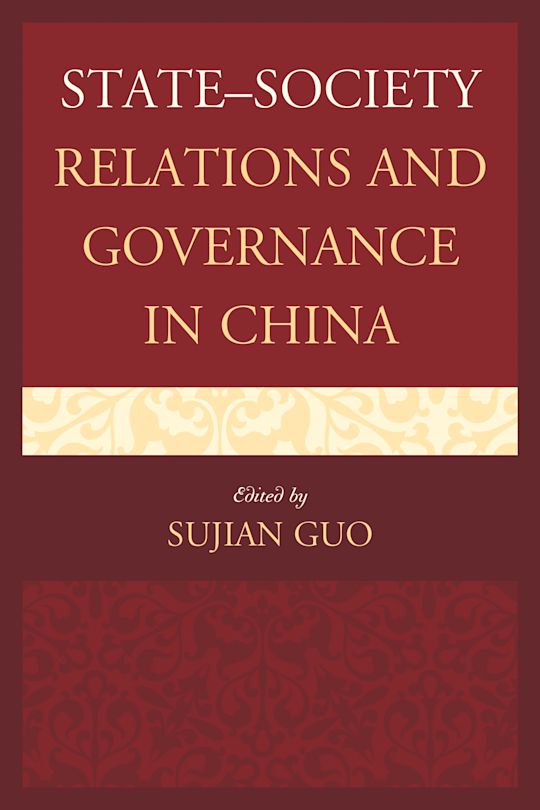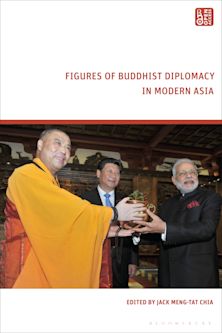- Home
- ACADEMIC
- Politics & International Relations
- Asian Politics
- State–Society Relations and Governance in China
State–Society Relations and Governance in China
Sujian Guo (Anthology Editor) , John Creed (Contributor) , Sheng Ding (Contributor) , Joseph Fewsmith (Contributor) , David S. G. Goodman (Contributor) , Wenshan Jia (Contributor) , Guoli Liu (Contributor) , Josef Gregory Mahoney (Contributor) , Edwin E. Moise (Contributor) , Nele Noesselt (Contributor) , G. Venkat Raman (Contributor) , Dorothy J. Solinger (Contributor) , Lynn T. White III (Contributor) , Teresa Wright (Contributor)
State–Society Relations and Governance in China
Sujian Guo (Anthology Editor) , John Creed (Contributor) , Sheng Ding (Contributor) , Joseph Fewsmith (Contributor) , David S. G. Goodman (Contributor) , Wenshan Jia (Contributor) , Guoli Liu (Contributor) , Josef Gregory Mahoney (Contributor) , Edwin E. Moise (Contributor) , Nele Noesselt (Contributor) , G. Venkat Raman (Contributor) , Dorothy J. Solinger (Contributor) , Lynn T. White III (Contributor) , Teresa Wright (Contributor)
You must sign in to add this item to your wishlist. Please sign in or create an account
Description
State–society relations and governance are closely related areas of study and have become important topics in the social sciences in the past decades, not only in developed countries but also in the developing world. In China, state-society relations have been changing in the new era of reform and opening, and governance has become a central concern in policy practice and in academia. In this wide-ranging collection of essays, written by scholars from both inside and outside China, the contributors explore the complexity of the changing state-society relationship and the modes and practices of governance in China by combining theoretical exploration and empirical case studies.
Table of Contents
Sujian Guo
Part I. State–Society Relations
Chapter 1: The State, the Poor, and the Dibao: Three Models of the Wellsprings of Welfare and Lessons for China
Dorothy J. Solinger
Chapter 2: New Economic Elites: Family histories and social change
David S G Goodman
Chapter 3: Coincidental Unwindings: Comparing Growing Economic Disparity and State-Society Relations in the United States and China
John Creed and Guoli Liu
Chapter 4: Chinese Public Policy: State-Society Relations in Historical Perspective
Edwin E. Moise
Chapter 5: Analyzing the Impacts of Civil Society Organizations on China’s Political Modernization
Sheng Ding
Chapter 6: Interethnic Competence as an Instrument for a Solid State-Society Relation in China
Wenshan Jia
Part II. Governance
Chapter 7: Governance in Theoretical and Comparative Perspective
Joseph Fewsmith
Chapter 8: The Development of Chinese Governance: Theoretical Perspectives
Josef Gregory Mahoney
Chapter 9: Temporal, Spatial, and Functional Governance of China’s Reform Stability
Lynn T. White III
Chapter 10: Stable Governance and Regime Type: Contemporary China in Comparative Perspective
Teresa Wright
Chapter 11: Governance Experiments: Adaptation and Innovation in Chinese State-Society Relations
Nele Noesselt
Chapter 12: Governance Challenge for the Chinese Leadership: Striving to Affect the Great Leap from Economics to Social Transformation
G Venkat Raman
Product details
| Published | Jul 09 2014 |
|---|---|
| Format | Ebook (PDF) |
| Edition | 1st |
| Extent | 254 |
| ISBN | 9798216302339 |
| Imprint | Lexington Books |
| Illustrations | 10 Tables |
| Series | Challenges Facing Chinese Political Development |
| Publisher | Bloomsbury Publishing |
About the contributors
Reviews
-
This volume brings together a group of essays by renowned China scholars examining a broad variety of state-society relations and governance issues in China. It is a cutting-edge volume addressing state-society relations from a theoretical, comparative, and historical perspective.
Thomas Heberer, University of Duisburg-Essen
-
Most classical political theory posits that the structure and policies of the government and state reflect underlying social realities. This, however, would not seem to be true of 'totalitarian' regimes. From 1949 into the early 1980s the social structure in China was in effect an artifact of the political system, dominated and shaped by the ruling elite according to the elite’s ideology and its evolving internal processes. Over the past generation and more Chinese society has become increasingly varied and complex; and while both the political and even social systems remain under the control of the Communist party, the Party itself has become more responsive to social interests and social interests have penetrated the structure and policies of the Party. China is developing a system different both from the previous totalitarian one and also from Euro-American pluralistic liberal democracy. This collection of studies by noted scholars of Chinese politics and political sociology traces the effects of the increased complexity of Chinese society and of state-societal interactions, making a valuable contribution to our understanding of contemporary Chinese politics and culture.
Peter Moody, University of Notre Dame



































